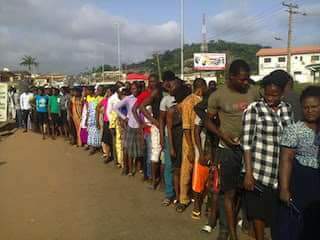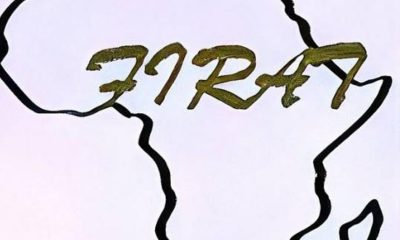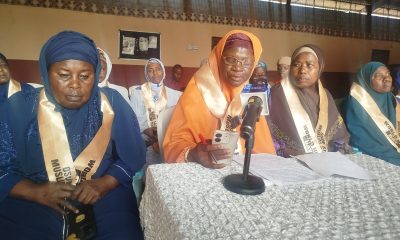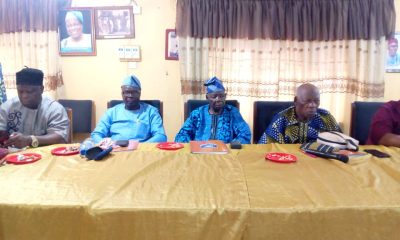columns
TuesdayRapAround: Osun 2018: That The People’s Votes May Count

Were there attempts to subvert the will of Osun people in the first leg of the gubernatorial election on Saturday, September 22, the answer is in the affirmative.
Of course, the umpire, INEC, has announced Thursday, 27th September as the date for the return leg.
Were there cases of vote-buying or attempted vote-buying? Yes, there were reported cases. This happened despite INEC’s warning to deal with perpetrators. The commission even partnered the Economic and Financial Crimes Commission (EFCC) and the Police.
The world is thus, watching to see what becomes of those allegedly arrested in Iwo Local Government and Fiwasaye area of Osogbo, the state capital.
Were there cases of ballot snatches, crisis, there were reports from trusted platforms suggesting same. These, however, were not as pronounced as was the case in the past. As of today, it is yet to be reported if there were human casualty as was the case in time past; except for the pocket of violence that trailed the announcement by INEC, particularly in Osogbo.
There were also videos of imported thugs, area boys making the rounds – people that naturally have no direct bearing with Osun State, let alone the voting exercise but due to vested interests in some quarters, they were imported to the state – to cause trouble or what?
Without mincing words, all these unfortunate developments (both reported and unreported) were partly or wholly designed to affect the outcome of the election.
Going by the unnecessary tension that is associated with elections, especially the usual voting practice where electorates have to present themselves physically on the day of elections to vote for their respective candidate of choice, don’t we think it’s high time the Independent Electoral Commission (INEC) begin to look inward with a view to taking future elections beyond this wasteful, tasking, challenging and highly demanding electoral practice?
This analogue style of conducting election, to be honest, is no longer fashionable in Nigeria.
To this end, it can safely be said that elections in Nigeria remain the bedrock upon which corruption is firmly rooted. It is the root cause of all malpractices – ranging from appointment and recruitment, allocation, performance in government, delivery of democratic dividend, provision of amenities, security etc.
In the open, government officials will deny poverty figure, and or rating in the country. But in actually sense, these same lords, power mongers are using it to further subjugate the people’s collective will; since they know that a hungry man will be more than ready to do their bidding once offered a token or any compensation.
No doubt, with electronic voting, there will definitely be reduction (if not total elimination) in the number of election-related problems – ballot snatching, voter apathy, falsification of results, ballot box stuffing, duplication of score sheets, under age voting, fictitious figures, diversion of electoral materials, thuggery, crisis etc.
Year in, year out, we have heard one form of violence, controversy or the other, yet, the Commission has kept fate with the same old, archaic system (though with slight improvement) that has done us no good over the years. This is simply because it is very easy, and simple for any dick, tom and harry to get into the corridor of power – this is largely due to flawed electoral system.
Today, everyone is complaining about incompetent leadership. Should we still look further before realising the loophole or root cause? When a system is faulty, it should be discarded forthwith. The same flawed system has succeeded in enthroning mediocrity, cluelessness, and also build strong individuals rather than the nation having strong institution.
If Nigeria is endowed with strong institutions, past leaders will have no means of escape, they surely will account for their wrong doings while in office. But because we have a deficient electoral system, incompetent people through whatever name it is called, find their way into power and they surely cannot do anything to effect meaningful change, to establish strong and virile institutions.
Contestants are not usually made to face the real test of their popularity, capacity and managerial skills – because there exist a process of electing leaders that is as flawed as the umpire itself.
It is not today that we have heard about officials of the commission colluding with corrupt politicians and other political investors (be it home and abroad) to pervert the course of justice, fairness, equity and the supremacy of the ballot.
Beyond what is reported, what about other dirty, offline deals that scale through without being noticed? Yet, after they might have subjugated the collective will of the people, they go down town to celebrate the cooked-up victories unknown to many that it was a stolen mandate.
Beneficiaries, sometimes, won’t rest on their oars, they rather go all out to denigrate others in this their ‘arm-twisting’ challenge, calling them unprinted names in the process. With this, if you’re not with a strong discerning mind, you’re made to believe whatever they say, or tell you.
Incidentally, hordes of ‘pen-pushers’ are usually on stand-by to pounce on dissenting voices.
As Nigeria looks forward to 2019 general elections, INEC cannot afford to toil with the destinies of the almost 200 million Nigerians to scuttle the process. The world is watching, and watching keenly. The commission must brace up to embrace modern ways, technologies that will guarantee a truly free, fair and credible election.
INEC has over the years shown that it is capable of creating more problems for the country than eminently required. If elections are held under serene and conducive atmosphere, one can bet there won’t be job/problem for members of the judiciary to solve.
If the process is truly transparent (not the type of transparency in a typical Nigerian politician language), we surely will have lesser tribunal issues to contend with.
The temptation to compromise the judicial process won’t be there at all. Issues such as judicial technicalities as have shamelessly been used in the past to reward highest bidders in certain gubernatorial tribunals would not have come up in the first place.
Nigeria can’t afford to continue in this unfortunate ‘arm-twisting challenge’ by power mongers. Let’s endeavour to have our institutions running and running as they ought to; as it is done in other clime.
-

 News4 days ago
News4 days agoFIRAT Offers USD 200,000 SnapGenius Research Facility To Boost Research Excellence In African Universities
-

 News5 days ago
News5 days ago2026 World Hijab Day: Osun Muslim Women Decry Discrimination, Demands Protection Of Hijab Rights
-

 News4 days ago
News4 days agoPolice Commence Investigation As Worshiper Mobbed To Death At Osogbo Central Mosque
-

 News4 days ago
News4 days agoPensioners Threaten Legal Action Against States Over Unpaid Pension Increases, Outstanding Entitlements



